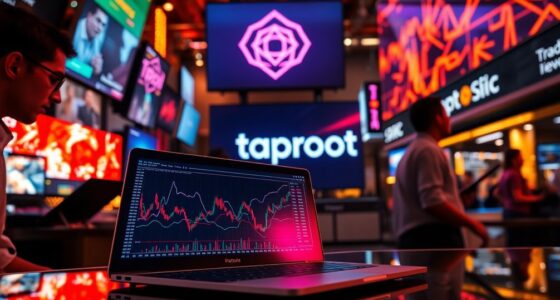If Solana secures ETF approval, it could significantly change how the market views it. You might find that the 'memechain' label, which has held it back, starts to fade. Major firms are pushing for ETF applications, and that growing institutional interest could lead to a surge in investment. But what does this mean for the future of Solana and its place in the cryptocurrency landscape? The implications are worth considering.

As the landscape of cryptocurrency evolves, Solana stands at a pivotal moment with the potential approval of an ETF, which could reshape its image from a 'memechain' to a credible player in traditional finance. The approval of an ETF would provide a regulated investment vehicle, enhancing Solana's credibility and attracting more institutional interest. Major firms like Canary Capital, VanEck, 21Shares, and Bitwise are already pursuing Solana ETF applications, highlighting a growing confidence in its future.
Solana is on the brink of transforming its reputation with potential ETF approval, attracting institutional interest and enhancing its credibility in finance.
The SEC has begun to acknowledge several Solana ETF filings, increasing speculation around possible approvals. Market sentiment reflects this optimism, with Polymarket data showing an 84% to 85% probability of Solana ETF approval by 2025. This positive outlook could unlock Solana's potential for large-scale financial applications, such as payments and trading, further distancing it from the 'memechain' narrative that has overshadowed its capabilities.
Despite its current associations, Solana has demonstrated robust developer activity, attracting 7,625 new developers in 2024—outpacing Ethereum. This surge in development underscores a shift in focus from memecoins to serious applications, bolstered by record trading volumes on its decentralized exchanges. Additionally, strong developer growth indicates increasing technical adoption, further solidifying Solana's market position.
In fact, over 90% of new tokens launched in Q4 2024 were created on the Solana blockchain, and its fee generation has already surpassed Ethereum's, showcasing its high user activity.
While the regulatory landscape remains complex, recent developments suggest a more crypto-friendly environment. The SEC's acknowledgment of Grayscale's application to convert its Solana Trust into an ETF sets an October deadline for a decision. The classification of SOL as a commodity or security is crucial in this context, as it directly impacts ETF approval.
With the SEC reassigning lawyers from crypto enforcement, the pressure could ease, allowing for a more favorable regulatory climate. However, Solana faces stiff competition from other altcoins like XRP and Litecoin in the race for ETF approval.
With Polymarket odds favoring Solana at an 85% chance, compared to XRP's 80%, it's clear there's potential for a significant market shift. As Solana continues to build its reputation through developer growth and platform utilization, the approval of an ETF could be the catalyst it needs to shed its 'memechain' label, solidifying its status as a serious contender in the world of cryptocurrency.









